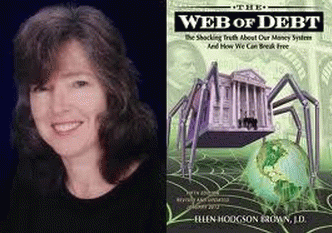I interviewed Ellen Brown on April 30th. This is part two of a two part interview transcript. Here's a link to the audio podcast.
Thanks to Don Caldarazzo for doing the transcript.
BIO:
Rob Kall: So tell us
a little bit more about the conference, and what's happening at the conference,
and who is speaking there. What are you
hoping to accomplish with this conference?
Ellen Brown: Ideally
what we should do is bring an initiative, particularly in California where I
live. We do initiatives, and they've
been quite successful, quite often. But
before you can do an initiative, people have to understand what you're talking
about. If you walk into a supermarket
and you say, "Do you want to sign my initiative for Gay Marriage?" or something
like that, people know immediately 'yes' or 'no' whether they support that or
they don't.
But if you say, "Will you sign my petition for a
State-owned bank?" their first thought is, "I don't trust the government, we've
got too many banks already." They don't
understand the concept of why it's better for the people and even better for
the local banks, etc; better for business, better for everything. So we wouldn't get very far with an
initiative. We've already done - in
California, we had a bill that made it all the way through both Houses of the
Legislature, and the Governor didn't sign it; so it's very difficult to do it
in the ordinary legislative way.
Our goal is to get lots of information out
there. The more people understand it,
then the more people understand how in jeopardy their money is right now in the
current system, and how corrupt the system is, then the more ability we'll have
to get the groundswell of support that you always need in order to change a
system like that, if you look at it historically.
Rob Kall: Just how
in jeopardy is the money that the people have?
From what I'm hearing from you is primarily their retirement, their life
savings that could be at risk, because the retirement funds and 401K's and what
have you, they've got money that could be basically grabbed by derivative
bankers. This is a problem.
Ellen Brown:
Right. All that money is sitting,
to the extent that it's setting anywhere -- I mean your stocks of course all you
own is a piece of -- well, it's not even a piece of paper, that's the problem:
you own these fungible stocks with no names on them. But the only actual money in the bank would
be money between your sales of stocks, and all that goes to the TBTF banks. But as far bank deposits go, that would be
normally the sort of lower -- I mean, the richest people don't keep a lot of
money on deposit; they'll only keep enough to pay their bills, and all the rest
they put somewhere else. So it's really
the small depositors, the people who live from paycheck to paycheck - they're
going to be the most vulnerable to that type of wipeout.
Next Page 1 | 2 | 3 | 4 | 5 | 6 | 7 | 8
(Note: You can view every article as one long page if you sign up as an Advocate Member, or higher).






